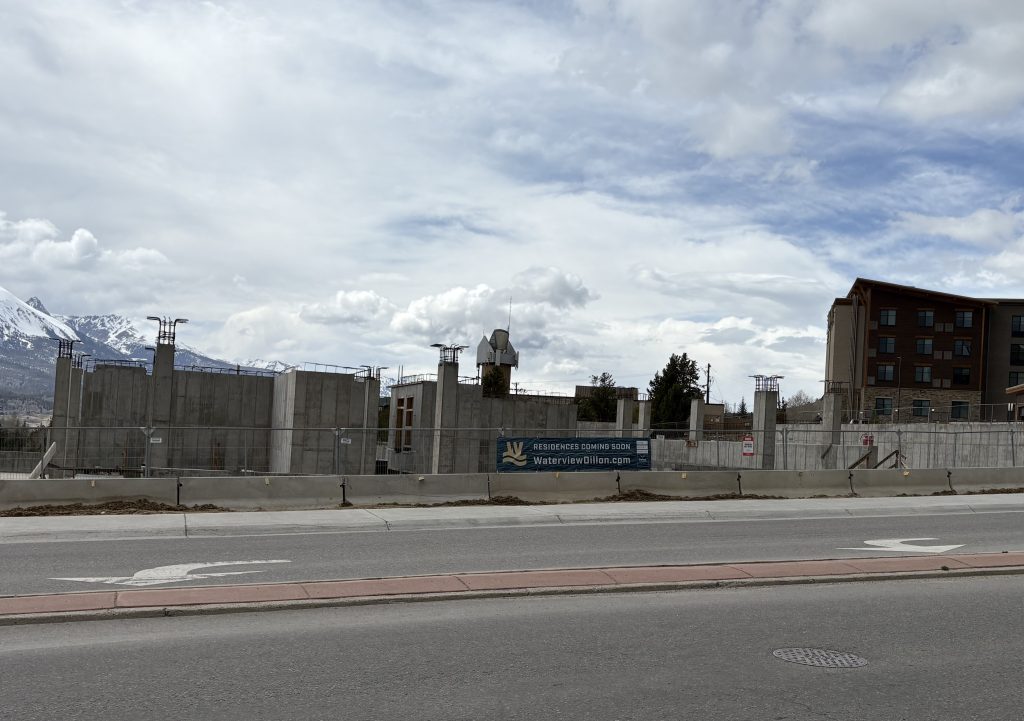Town lawyer gives Dillon council an overview of local metro district related to town core development, Porritt
The council has expressed concerns about the Triveni Square Metro District and heard a presentation from a critic of metro districts in May

Kyle McCabe/Summit Daily News
After hearing from a critic of metropolitan districts in May, the Dillon Town Council heard another presentation about the special districts from the town attorney Aug. 26.
Attorney Kathryn Winn said she has “no personal opinions” on metro districts. She said Colorado has some “really good” metro districts, as well as some “really bad” ones.
“(There are) quite a few that are successful,” Winn said. “There’re quite a few that end up in the newspaper.”
Her presentation covered how the districts work, the statutory limits on them, what oversight town governments have and specific information about the Triveni Square district in Dillon.
The Triveni Square Metro District formed two years ago for Developer Jake Porritt’s redevelopment plans in town. Some plans, and the district itself, have proven controversial, with residents overturning approval for one project and recalling, or removing, council members who voted for the projects.
Winn started by talking about the purpose of metro districts, highlighting that they provide a variety of services from water and sewer to fire protection and mosquito control. The districts provide public improvements by allowing developers to recoup money they provide upfront through bonds, she said.
Alternatives to metro districts exist, Winn said, although they include private debt, which is often more expensive because of higher interest rates.
“Just talking about a residential subdivision, the cost of that private debt is going to be recouped through the sale price of the house,” Winn said. “The sale price of the house is going to cost more.”
Winn also said some places have municipalities fund public improvements, although it can be difficult to get voter approval to approve issuing bonds for improvements within a small area.
When John Henderson, an attorney with Coloradans for Metro District Reform, spoke to the town council in May, he raised questions about the amount of debt the district could issue and its inclusion area, which includes properties that could be added to the district without amending the district service plan.
Winn touched on both issues in her presentation. She said Triveni Square, through a vote of its board, approved $120 million of debt in each of several categories. All the debt approved adds up to about $3 billion, but Winn said the service plan will only allow the district to issue $120 million in bonds total.
“My understanding is that they do it simply to provide for flexibility,” Winn said. “If there were ever a service plan amendment to increase the debt limitation, they don’t have to go back to the voters and ask for more debt.”
Service plan amendments need to be approved by the town council, Winn said.
In previous Summit Daily reporting, Triveni Metro District board attorney Trish Harris wrote in a statement that approving the “redundant amounts” gives the district “maximum flexibility of the use of bond proceeds for all categories of public improvements, such as streets, water and sewer.”
In Winn’s legal opinion, she said, the ballot question requesting approval for more debt than the district can actually issue is not a violation of state law.
Council member Barbara Richard asked how the town would know if a metro district issued more debt than its service plan’s limit, and Winn said the town would receive notice. The district has to give the town notice every time it issues debt, she said, and Harris added that the district has to provide annual reports to the town.
Winn talked about Triveni Square’s boundaries, which include the district boundaries and inclusion area. The original boundaries had just over a quarter of an acre of land, she said, while the original inclusion area had 18.7 acres.
The inclusion area can include property without the permission of the property owner, Winn said, but property in the area is not subject to district taxes. Properties in the area can join the district without a service plan amendment, which must be approved by the town council.
For a property owner with land in the inclusion area to join the district, they need to petition the metro district and get its board’s approval.
“(If) the developer controls the metro district, and the developer owns the property that is in the inclusion area, that’s fairly easy consent, right?” Winn said. “Otherwise, they have to do some work to get property owners to want to include.”
Richard asked how a property owner with land inside the inclusion area could ask to be removed. Winn said the only way to modify the inclusion area is through a change to the service plan.
The town council approved a change to the service plan in March, Winn said, taking some property out of the inclusion area and adding some in.
It removed the movie theater property on Dillon Ridge Road, which Harris said the development group originally planned on redeveloping, but by the time of the amendment, the group was “no longer anticipating developing the theater.”
Between the original service plan approval and the amendment, the developers purchased and made plans to redevelop the Uptown 240 property, which they renamed Waterview. The amendment added that property to the inclusion area, then the district board added it to the district boundaries, Harris said.
Winn also covered other specifics of the Triveni Square service plan, like its limitations on mill levys, when the levys expire, its need for town approval to use eminent domain and limits on the district in applying for grants that could compete with town grant applications.
Council member Rachel Tuyn asked Winn if she is comfortable with the service plan “in terms of the assurances of the town to have the control we need over some of our concerns.”
Winn said the service plan is “not badly written.”
“The town has input, and the town has restrictions in it,” Winn said. “It’s not a service plan that I would have necessarily written this way … There’s nothing inherently in here that makes me squeamish.”
Winn suggested the council look into creating a model service plan so that the next time a developer asks the town to create a metro district, it knows what sorts of language and limitations it wants to include.

Support Local Journalism

Support Local Journalism
As a Summit Daily News reader, you make our work possible.
Summit Daily is embarking on a multiyear project to digitize its archives going back to 1989 and make them available to the public in partnership with the Colorado Historic Newspapers Collection. The full project is expected to cost about $165,000. All donations made in 2023 will go directly toward this project.
Every contribution, no matter the size, will make a difference.










